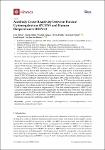Antibody Cross-Reactivity between Porcine Cytomegalovirus (PCMV) and Human Herpesvirus-6 (HHV-6)
Fiebig, Uwe
Holzer, Angela
Ivanusic, Daniel
Plotzki, Elena
Hengel, Hartmut
Neipel, Frank
Denner, Joachim
Porcine cytomegalovirus (PCMV) infection is widely prevalent among pigs, and PCMV is one of the viruses which may be transmitted during xenotransplantation using pig cells, tissues, or organs. While human cytomegalovirus (HCMV) is a major risk factor for allotransplantation, it is still unclear whether PCMV is able to infect human cells or pose a risk for xenotransplantation. Previously, it was shown that transmission of PCMV after pig kidney to non-human primate transplantations resulted in a significantly reduced survival time of the transplanted organ. To detect PCMV, PCR-based and immunological methods were used. Screening of pigs by Western blot analyses using recombinant viral proteins revealed up to 100% of the tested animals to be infected. When the same method was applied to screen human sera for PCMV-reactive antibodies, positive Western blot results were obtained in butchers and workers in the meat industry as well as in normal blood donors. To exclude an infection of humans with PCMV, the sera were further investigated. PCMV is closely related to human herpesvirus-6 (HHV-6) and human herpesvirus-7 (HHV-7), and a sequence alignment of glycoprotein B suggests that the antibodies may cross-react with identical epitope sequences. HCMV is not related with PCMV, and no correlation between antibody reactivity against PCMV and HCMV was detected. These data indicate that antibodies against PCMV found in humans are cross-reactive antibodies against HHV-6.
No license information

